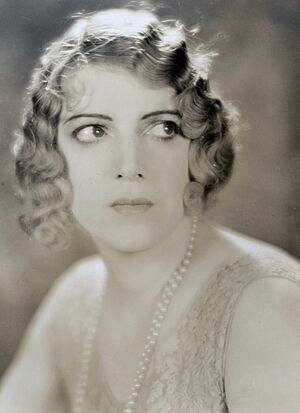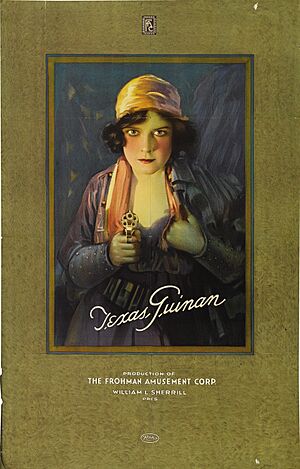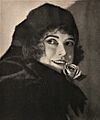Texas Guinan facts for kids
Quick facts for kids
Texas Guinan
|
|
|---|---|

Guinan, c. 1920
|
|
| Born |
Mary Louise Cecilia Guinan
January 12, 1884 Waco, Texas, U.S.
|
| Died | November 5, 1933 (aged 49) Vancouver, British Columbia, Canada
|
| Resting place | Calvary Cemetery, Queens |
| Occupation | Actress, producer, entrepreneur |
| Years active | 1906–1933 |
| Spouse(s) |
John J. Moynahan
(m. 1904; div. 1906) |
Mary Louise Cecilia "Texas" Guinan (January 12, 1884 – November 5, 1933) was a famous American actress, producer, and business owner. She was born in Texas to parents who had moved there from Ireland. From a young age, Texas wanted to be an entertainer.
She became a star on the New York stage. Later, she moved into the film business. She spent several years in California acting in many movies. Eventually, she even started her own movie company.
Texas Guinan is best known for the secret clubs she ran during a time called Prohibition. During Prohibition, it was against the law to sell or transport alcohol. Her clubs were popular places where rich and famous people, as well as new talented artists, would gather. She faced legal challenges for her clubs but was found not guilty in court.
Contents
Early Life and Career Beginnings
Texas Guinan was one of four children. She was born in Waco, Texas. Her parents, Michael and Bessie Guinan, were immigrants from Ireland. They first ran a grocery business in Colorado before moving to Texas. There, they owned a horse and cattle ranch.
As a child, Texas was called "Mamie." She went to a religious school in Waco. Growing up on a ranch taught her cowboy skills. She also became very good at shooting at a local shooting gallery.
In 1898, she won a two-year scholarship. This allowed her to study at the American Conservatory of Music in Chicago. After improving her singing voice, she joined a touring acting group. This group performed "Wild West" shows.
Around 1904, using the name Marie Guinan, she married newspaper cartoonist John Moynahan. They divorced a few years later. Texas then moved to New York to become a singer. She often told stories that she was born with the name Texas. She even claimed her father was the first white child in Waco, which was not true.
A theatre critic named Julian Johnson helped her create her public image. Many people thought they were married, but her first husband, John Moynahan, is believed to be her only husband.
Stage and Vaudeville Shows
Texas Guinan started as a chorus girl. She changed her stage name to Texas Guinan. This helped her stand out in the busy world of vaudeville and New York theatre. Within a year, she got a main role in a play called Simple Simon Simple.
In 1908, she was praised for her acting in The Gibson Girl Review. She even offered $1,000 for a popular new song. Texas sang as a soprano in many shows. These included The Gay Musician and The Lone Star.
By 1910, she was a national star. She toured in a show called The Kissing Girl. In 1913, she was a main performer in The Passing Show. Around this time, Texas allowed her name to be used for a weight-loss plan. Advertisements claimed she lost 70 pounds using it.
However, a newspaper found that Texas was paid to promote the plan. It was discovered to be a trick. The postal service stopped her from receiving mail. This incident hurt her stage career. It made her decide to try working in movies in California.
Texas also appeared in a variety show called Hop-o'-My-Thumb in 1913. She toured the U.S. with a musical comedy in 1915. During this tour, she told a story about meeting Kaiser Wilhelm II in Berlin. This story was never proven true.
She continued to perform in musicals. These included Gay Paree in 1925 and Padlocks of 1927.
Movie Career
Texas Guinan started her film career in 1917. She was one of the first women filmmakers in the United States. She later claimed to have entertained troops in France in 1917. She also said she received a medal from a French general. But these stories were not true. She was busy making movies in California at that time.
She made four short films between 1917 and 1918. These included The Fuel of Life and The Gun Woman. She moved towards making Western movies. Her dressing room door even had a map of Texas on it. People started calling her "the female Bill Hart." He was a very famous Western movie star.
Frohman Amusement Corporation made many films with Texas in 1918. Some of these were The Boss of the Rancho and The Heart of Texas.
Texas began to work behind the scenes in filmmaking. She became a unit department head on several films. In 1921, she started her own company, Texas Guinan Productions. She produced movies like Code of the West and Spitfire.
Later, she appeared in two sound movies. She played a version of herself as a speakeasy owner. These films were Queen of the Night Clubs (1929) and Broadway Thru a Keyhole (1933). She made the second film shortly before she passed away.
Queen of the Night Clubs
In 1920, a law called Prohibition began in the U.S. It made selling and transporting alcohol illegal. But people still wanted to drink. This led to the rise of "speakeasy" clubs. These were secret places where alcohol was sold. Texas Guinan became very famous for running these clubs.
She started working as a singer at the Beaux Arts club in 1923. She was paid a lot of money for this job. Texas was good at talking with her customers. This inspired a producer to create a full show with her as the host.
She became known for her famous saying, "Hello, Sucker! Come on in and leave your wallet on the bar." She got half of the profits for attracting wealthy customers. Many future stars, like Ruby Keeler and Barbara Stanwyck, were discovered dancing at her club.
Texas and her partners often had their clubs shut down by the police. But they would quickly open new clubs in different locations with new names. She opened the Texas Guinan Club, which was also closed by the police. She once said they made $700,000 in less than a year.
In 1926, Texas returned to New York. She became the hostess of the 300 Club. Many celebrities visited her club. These included Al Jolson and the Prince of Wales.
In July 1926, the 300 Club was raided by police. They took alcohol and arrested two people. In June 1928, many speakeasy clubs in New York were raided. Texas Guinan and over 100 others were arrested. They faced possible prison time and fines. But at her trial in April 1929, Texas was found not guilty.
Later Years and Passing
During the Great Depression, Texas Guinan took her show on tour. She tried to move to Europe. However, she was on a list of "barred aliens" in England. This meant she was not allowed to enter the country. Her show was also banned from France due to work laws.
Texas used this to her advantage. When she returned to NY in 1933, she launched a funny show called Too Hot for Paris.
While touring with Too Hot for Paris, she got sick in Chicago. She had amoebic dysentery. This was from a disease outbreak at a hotel during the Chicago World's Fair. She became very ill in Vancouver, British Columbia. She passed away there on November 5, 1933, at age 49. This was just one month before Prohibition ended.
About 7,500 people attended her funeral. She was buried at the Calvary Cemetery in Queens, New York. Her family donated a special item to a church in Vancouver. This was to thank a priest who helped her in her final hours.
Texas Guinan's parents outlived her. Her father passed away at 81 in 1935. Her mother lived to be 101, passing in 1959. Her brothers and sister also survived her.
Legacy and Portrayals
Texas Guinan's unique personality and career left a lasting mark. She has been portrayed by actresses and inspired many fictional characters.
Actresses Playing Texas Guinan
- 1927 – Broadway Nights, played by De Sacia Mooers
- 1945 – Incendiary Blonde, played by Betty Hutton
- 1961 – The George Raft Story, played by Barbara Nichols
- 1961 – Splendor in the Grass, played by Phyllis Diller
Fictional Characters Inspired by Texas Guinan
- 1920s – Miss Missouri Martin in Damon Runyon's Broadway stories
- 1932 – Maudie Triplett, played by Mae West, in Night After Night
- 1939 – Panama Smith, played by Gladys George, in The Roaring Twenties
- 1960 – Sally Kansas, played by June Havoc, in an episode of The Untouchables
- 1984 – Vera, played by Diane Lane, in The Cotton Club
- Velma Kelly from the musical Chicago; her personality was based on Guinan.
- Guinan, a fictional bartender played by Whoopi Goldberg, in Star Trek: The Next Generation
Other Mentions
- 2007 – Black Hats, she appears as a character in this novel.
Images for kids
Filmography
| Year | Title | Production | Notes | Ref(s) |
|---|---|---|---|---|
| 1917 | The Fuel of Life | Triangle Film Corporation | ||
| 1917 | The Stainless Barrier | Triangle Film Corporation | ||
| 1918 | The Gun Woman | Triangle Film Corporation | ||
| 1918 | The Love Brokers | Triangle Film Corporation | ||
| 1918 | Getaway Kate | Astra Films | ||
| 1918 | The Hell Cat | Goldwyn Pictures | Lost film | |
| 1919 | The Boss of the Rancho | Frohman Amusement Corp. | ||
| 1919 | The Call of Bob White | Frohman Amusement Corp. | ||
| 1919 | The Dangerous Little Devil | Frohman Amusement Corp. | ||
| 1919 | The Dead Man's Hand | Frohman Amusement Corp. | ||
| 1919 | The Girl of Hell's Agony | Frohman Amusement Corp. | ||
| 1919 | The Heart of Texas | Frohman Amusement Corp. | ||
| 1919 | Just Bill | Frohman Amusement Corp. | ||
| 1919 | Little Miss Deputy | Frohman Amusement Corp. | ||
| 1919 | Malamute Meg | Frohman Amusement Corp. | ||
| 1919 | The Sacrifice | Frohman Amusement Corp. | ||
| 1919 | The She Wolf | Frohman Amusement Corp. | ||
| 1919 | Some Gal | Frohman Amusement Corp. | ||
| 1919 | South of Santa Fe | Frohman Amusement Corp. | ||
| 1919 | The Spirit of Cabin Mine | Frohman Amusement Corp. | ||
| 1919 | Letters of Fire | Melody Productions | ||
| 1919 | The Love Defender | World Film Company | ||
| 1919 | Texas Guinan and Jack Hane | |||
| 1919 | My Lady Robin Hood | Bull's Eye Productions/Reelcraft | ||
| 1919 | Outwitted | Bull's Eye Productions/Reelcraft | also unit department head | |
| 1919 | The Lady of the Law | Bull's Eye Productions/Reelcraft | also unit department head | |
| 1919 | The Girl of the Rancho | Bull's Eye Productions/Reelcraft | also unit department head | |
| 1919 | The Desert Vulture | Bull's Eye Productions/Reelcraft | also unit department head | |
| 1919 | Fighting the Vigilantes | Bull's Eye Productions/Reelcraft | also unit department head | |
| 1920 | The Moonshine Feud | Bull's Eye Productions/Reelcraft | also unit department head | |
| 1920 | The Night Rider | Bull's Eye Productions/Reelcraft | also unit department head | |
| 1920 | Not Guilty | Bull's Eye Productions/Reelcraft | also unit department head | |
| 1920 | The White Squaw | Bull's Eye Productions/Reelcraft | also unit department head | |
| 1920 | The Wildcat | Bull's Eye Productions/Reelcraft | ||
| 1921 | Code of the West | Texas Guinan Productions | ||
| 1921 | Spitfire | Texas Guinan Productions | ||
| 1921 | Texas of the Mounted | Texas Guinan Productions | ||
| 1921 | I Am the Woman | Victor Kremer Film Features | ||
| 1921 | The Stampede | Victor Kremer Film Features | ||
| 1924 | Night Life of New York | Famous Players–Lasky | Lost film | |
| 1929 | Queen of the Night Clubs | Warner Bros. | Lost film | |
| 1929 | Glorifying the American Girl | Paramount Famous Lansky Corp. | Uncredited as herself | |
| 1933 | Broadway Through a Keyhole | Twentieth Century Pictures | Written by Walter Winchell |
Written by Texas Guinan
- "How to Keep Your Husband Out of My Night Club", Liberty magazine, No 18, April 30, 1932, pp. 50–51
- "Oh, Professor!", College Humor, June 1932, p. 24.
See also
 In Spanish: Texas Guinan para niños
In Spanish: Texas Guinan para niños
 | Sharif Bey |
 | Hale Woodruff |
 | Richmond Barthé |
 | Purvis Young |









